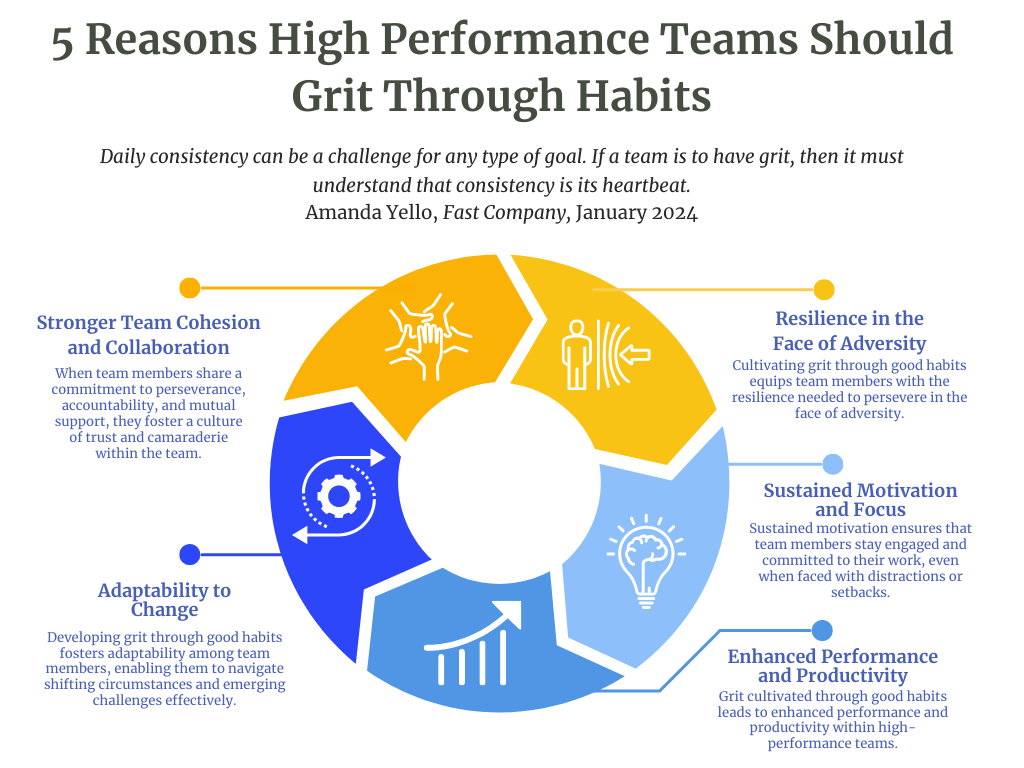
5 Reasons Why High Performance Teams Should Develop Grit
Developing grit through good habits is essential for high-performance teams. As Amanda Yello noted in a Fast Company article from January 2024 “Daily consistency can be a challenge for any type of goal. If a team is to have grit, then it must understand that consistency is its heartbeat.” Here are five of the many reasons why high-performance teams should develop grit through habits:
- Resilience in the Face of Adversity: High-performance teams encounter numerous challenges, setbacks, and obstacles on their journey toward achieving ambitious goals. Cultivating grit through good habits equips team members with the resilience needed to persevere in the face of adversity. By consistently practicing habits such as perseverance, resilience, and optimism, teams develop the mental toughness to weather challenges without losing sight of their long-term objectives.
- Sustained Motivation and Focus: Good habits contribute to sustained motivation and focus within high-performance teams. When team members develop routines that prioritize goal-oriented behaviors, such as setting clear objectives, managing time effectively, and maintaining accountability, they remain driven and focused on achieving their targets. This sustained motivation ensures that team members stay engaged and committed to their work, even when faced with distractions or setbacks.
- Enhanced Performance and Productivity: Grit cultivated through good habits leads to enhanced performance and productivity within high-performance teams. When team members consistently practice habits that optimize their workflow, such as prioritizing tasks, minimizing distractions, and seeking continuous improvement, they maximize their efficiency and output. This increased productivity enables high-performance teams to accomplish more in less time, driving progress toward their goals and maintaining a competitive edge in their endeavors.
- Adaptability to Change: High-performance teams operate in dynamic environments characterized by rapid change and uncertainty. Developing grit through good habits fosters adaptability among team members, enabling them to navigate shifting circumstances and emerging challenges effectively. By cultivating habits such as flexibility, open-mindedness, and proactive learning, teams develop the agility needed to pivot strategies, embrace new opportunities, and overcome unforeseen obstacles, ensuring their continued success in evolving contexts.
- Stronger Team Cohesion and Collaboration: Good habits that promote grit also contribute to stronger team cohesion and collaboration. When team members share a commitment to perseverance, accountability, and mutual support, they foster a culture of trust and camaraderie within the team. This sense of solidarity encourages collaboration, fosters effective communication, and enhances collective problem-solving abilities. By developing grit through good habits, high-performance teams create a supportive environment where individuals thrive and collaborate synergistically toward shared goals.
In summary, high-performance teams should develop grit through good habits because it leads to resilience in the face of adversity, sustained motivation and focus, enhanced performance and productivity, adaptability to change, and stronger team cohesion and collaboration. By cultivating these habits, teams position themselves for long-term success and excellence in achieving their objectives.

